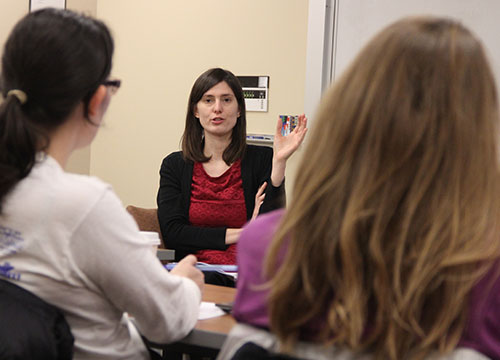SPH Students Dive into State Budget Debate on Housing Voucher Funding.
As Massachusetts lawmakers debate funding recommendations for the state’s 2015 budget, their deliberations about housing vouchers for low-income families will be guided by research conducted by BUSPH students.
The nine students in Professor Jonathan Levy’s EH800: Community-Based Methods in Environmental Health were challenged to compile a detailed health-impact assessment on the potential public-health benefits of a proposed $30 million increase in the state program that provides very low-income families with rent subsidies.
The state budgeted $57.5 million for 2014 in subsidized rent vouchers for families on the cusp of homelessness. Several advocacy groups have proposed increasing that to $87.5 million for fiscal year 2015, which would approach the levels spent in the mid-1990s – when far fewer families were actually homeless.

Based on their research of existing studies and supported by an array of demographic, economic and health data, the students found that the proposed funding increase would provide a variety of health benefits for entire families.
About 4,200 families are currently in emergency shelters or are housed in motels at state expense. The students noted that these figures do not account for the families living beyond the reach of state and local agencies, families who are doubled-up with other families, in unsafe housing or living on the streets.
Many of these families have parents who are working, said Liza Hirsch, an attorney at the Massachusetts Law Reform Institute (MLRI) who helped the students review their report before it was presented to legislators.
“It’s very hard for families to get into the system,” Hirsch said. “They have to be in a shelter at some point, or they’re eligible when they have stayed in a place deemed unfit for human habitation, essentially the street, an emergency room, or their car.”
Some families can linger on the waiting list for a year or more, Hirsch said.
According to the assessment, increased voucher aid will enable more homeless families to afford to rent an apartment, which could decrease the risk of infectious disease and stress caused by living on the streets or in shelters. Those families struggling to stay in existing housing could find rent more affordable, and be able to increase money allocated for food, heat, healthcare and transportation.
Some families might be able to find housing in a more stable neighborhood, decreasing their exposure to poverty and crime; others might be able to move out of decrepit housing and benefit from improved indoor air quality due to lower exposure to chemicals and allergens.
In 2013, the report states, there were 19,029 people in Massachusetts who were temporarily homeless or without a permanent home for an extended time. Between 2012 and 2013, the state had the fifth-highest increase of homelessness among all states.
The issue is particularly acute in eastern Massachusetts, Hirsch said, possibly due to the inherent high cost of housing in the region. “Many of my clients are working but they can’t afford market-rate rents in and around Boston.”
Megan Sandel, an associate professor of pediatrics and public health at the BU schools of medicine and public health, presented the report’s findings to legislators in the House and Senate Ways and Means committees. The budget process is expected to last much of the spring.